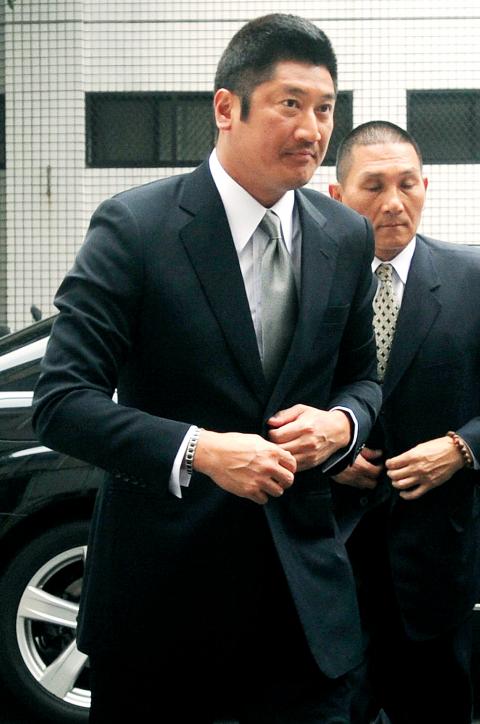The Supreme Prosecutors’ Office Special Investigation Division (SID) told former Chinatrust Financial Holding Co (中信金控) vice chairman Jeffrey Koo Jr (辜仲諒) in Japan that he would not be detained if he made a legal statement against former president Chen Shui-bian’s (陳水扁) family, Koo Jr’s attorney said yesterday.
As such, Koo’s statement should not be used as evidence in court, Koo Jr’s attorney Fang Po-hsun (方伯勳) told a court hearing yesterday.
He also requested that the court summon Fu Zu-sheng (傅祖聲), the lawyer of the late Chinatrust Financial Holding Co founder and chairman Jeffery Koo Sr (辜濂松), and JPMorgan Chase Bank in Taiwan senior country officer Carl Chien (錢國維) to testify.

Photo: Wang Yi-sung, Taipei Times
When asked for comment later yesterday, the SID said that no such “give and take” exists and the remarks were tactics by Koo Jr’s attorney.
According to Fang, SID prosecutors went to Japan to urge Koo Jr to return to Taiwan to face trial and “enticed” him by saying that if he returned to Taiwan to make a statement against the Chen family, he would not be detained and could be allowed to visit his children abroad.
As a result, Koo Jr said the proceeds from his company’s purchase of a stake in Mega Financial Holding Co (兆豐金控) were to pay the Chen family, but such remarks were the result of prosecutors’ enticement and not from his own free will, and as such could not be used in court, Fang said.
Koo Jr was sentenced to nine years in jail by the Taipei District Court for his company’s illegal purchase of a stake in Mega Financial Holding Co.
He fled the country in November 2006 during prosecutors’ investigations, staying in Japan, among other places.
He returned to Taiwan in December 2008 to stand trial.
The Taipei District Court ruled that he had violated the Securities Exchange Act (證券交易法) and the Banking Act (銀行法).
The district court said Koo Jr and several company executives had used NT$27.5 billion (US$920 million) to buy a 9.9 percent stake in Mega Financial through a Hong Kong branch of Chinatrust in 2004, without the approval of the Chinatrust board.
That included the illegal purchase of US$390 million in loan notes, convertible into Mega Financial shares, using money earmarked for deposits and then locking in profits from the transaction through insider trading, the court said.
The case is pending in the Taiwan High Court.
Additional reporting by staff writer

CHAOS: Iranians took to the streets playing celebratory music after reports of Khamenei’s death on Saturday, while mourners also gathered in Tehran yesterday Iranian Supreme Leader Ayatollah Ali Khamenei was killed in a major attack on Iran launched by Israel and the US, throwing the future of the Islamic republic into doubt and raising the risk of regional instability. Iranian state television and the state-run IRNA news agency announced the 86-year-old’s death early yesterday. US President Donald Trump said it gave Iranians their “greatest chance” to “take back” their country. The announcements came after a joint US and Israeli aerial bombardment that targeted Iranian military and governmental sites. Trump said the “heavy and pinpoint bombing” would continue through the week or as long

TRUST: The KMT said it respected the US’ timing and considerations, and hoped it would continue to honor its commitments to helping Taiwan bolster its defenses and deterrence US President Donald Trump is delaying a multibillion-dollar arms sale to Taiwan to ensure his visit to Beijing is successful, a New York Times report said. The weapons sales package has stalled in the US Department of State, the report said, citing US officials it did not identify. The White House has told agencies not to push forward ahead of Trump’s meeting with Chinese President Xi Jinping (習近平), it said. The two last month held a phone call to discuss trade and geopolitical flashpoints ahead of the summit. Xi raised the Taiwan issue and urged the US to handle arms sales to

BIG SPENDERS: Foreign investors bought the most Taiwan equities since 2005, signaling confidence that an AI boom would continue to benefit chipmakers Taiwan Semiconductor Manufacturing Co’s (TSMC, 台積電) market capitalization swelled to US$2 trillion for the first time following a 4.25 percent rally in its American depositary receipts (ADR) overnight, putting the world’s biggest contract chipmaker sixth on the list of the world’s biggest companies by market capitalization, just behind Amazon.com Inc. The site CompaniesMarketcap.com ranked TSMC ahead of Saudi Aramco and Meta Platforms Inc. The Taiwanese company’s ADRs on Tuesday surged to US$385.75 on the New York Stock Exchange, as strong demand for artificial intelligence (AI) applications led to chip supply constraints and boost revenue growth to record-breaking levels. Each TSMC ADR represents

State-run CPC Corp, Taiwan (CPC, 台灣中油) yesterday said that it had confirmed on Saturday night with its liquefied natural gas (LNG) and crude oil suppliers that shipments are proceeding as scheduled and that domestic supplies remain unaffected. The CPC yesterday announced the gasoline and diesel prices will rise by NT$0.2 and NT$0.4 per liter, respectively, starting Monday, citing Middle East tensions and blizzards in the eastern United States. CPC also iterated it has been reducing the proportion of crude oil imports from the Middle East and diversifying its supply sources in the past few years in response to geopolitical risks, expanding